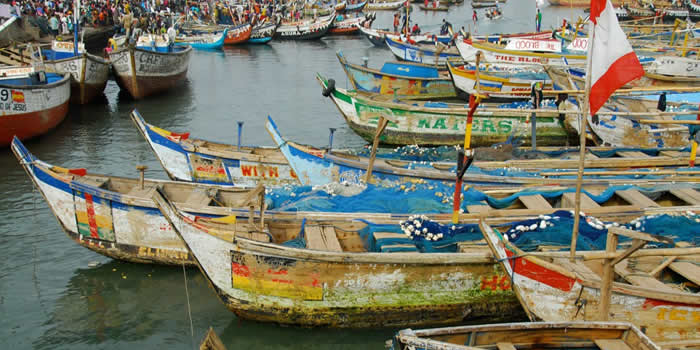Adverts
AGRICULTURE
Fisheries Ministry gets tough on Closed Season
The Ministry of Fisheries and Aquaculture Development and the Fisheries Commission is urging all fisher folks in the marine sector to adhere to the one month ‘Closed Season’ in August to avoid facing serious sanctions.

Date Created : 7/16/2018 2:30:00 AM : Story Author : Dominic Shirimori/Ghanadistricts.com
Those who will violate the rule by engaging in fishing during the closed season commits an offence liable to a summary conviction to a fine of not less than;
• $500,000 and not more than $2 million in respect of local industrial or semi- industrial vessels, or
• 100 penalty units and not more than 500 penalty units in any other case; and in addition any catch gear or vessel or any combination of them used in the commission of the offence may be forfeited to the state.
The Minister of Fisheries and Aquaculture Development, Elizabeth Afoley Quaye gave the admonishing when she declared the 2018 Closed Season at a press conference as starting from Tuesday, August 7, to Tuesday, September 4, 2018. Thus legal fishing recommences on September 5, 2018.
Implementation of the closed season- a period in which fishing is banned in the marine sector, the Minister noted is one of many measures being adopted as a sustainable fishing management practice informed by scientific data to help reverse the dwindling fish stock in the Ghanaian waters.
August has been chosen for the observation of the closed season because it has been scientifically proven as the best period for spawning, the Minister stated.
Unlike 2016, 2017 where artisanal fishing was not included in the observation of the closed season, this August period is to be observed by all fleets including canoe, inshore boats and trawlers, with the exception of Tuna vessels, the Minister emphasized.
The practice, Madam Afoley indicated has always been part of the law, except that implementation has been a challenge, hence the sector is seriously threatened by imminent collapse.
Section 84 (1) (a) of Fisheries Act of 2002, Act 625 states that “the Fisheries Commission may by notice in the Gazette ‘declare Closed Seasons’ including their duration, for fishing in specific areas of the coastal waters or the riverine system Closed seasons”.
Again, Sub-Part I, Sections 42, 43, 44, and 45 directs how fisheries management plans should be prepared and Section 42 (1) (a) notes that any plan or decision making in the fisheries must be based on the best available science. Sub-Part I of the law is the basis of the National Marine Fisheries Management Plan and section 4.2 of the plan states that ‘there shall be a closed season for all fleets”, she added.
Observation of the closed season would not be a one off process, instead, it would be observed yearly until stock level improves. And this, she disclosed would be done alongside other management measures such as:
• Cease light fishing and other obnoxious practices
• Mesh size regulations
• Stop use of illegal monofilament nets, stop saiko fishing,
• Reduce number of trawlers in our waters,
• Reconsider joint venture arrangements,
• Close marine protected areas
• Reduce conflicts at seas, as well as
• Arrangement for flagging vessels as Ghanaian.
“Continuing with the closed season policy and with good fisheries management and enforcement practices against illegal fishing, it is expected that landings of the small pelagic fish by artisanal fishers will increase from as low as 15,000 MT in 2017 to an expected 90,000 MT in 2025”, she added.
The sector Minister called on all and sundry to support the implementation of the closed season to prevent eminent collapse of the fishing sector by improving the fish stock, achieve national food security, improve employment opportunities in the sector and reduce poverty.
Meanwhile, industry players and the general public are assured that security forces and other law enforcement agencies will be on standby to ensure an incident free closed season.


 facebook
facebook twitter
twitter Youtube
Youtube TOLL FREE 0800 430 430
TOLL FREE 0800 430 430 +233 593 831 280
+233 593 831 280 GPS: GE-231-4383
GPS: GE-231-4383 info@ghanadistricts.com
info@ghanadistricts.com Box GP1044, Accra, Ghana
Box GP1044, Accra, Ghana